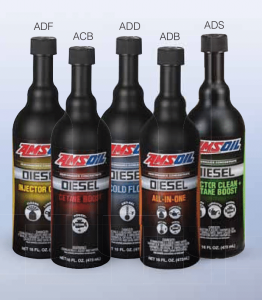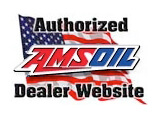27 Jun A CLOSER LOOK AT BIODIESEL
AMSOIL diesel fuel additives help preserve performance of biodiesel and keep diesels on the road.
Presenting a renewable option for diesel engines, biodiesel is formulated from vegetable oils and animal fats, with blends up to B20 approved for use by many major engine manufacturers. and some performance improvements over conventional ultra-low-sulfur diesel (ULSD) fuel. Like many benefits, however, they do come with some tradeoffs.
BENEFITS:
- Increased Lubricity
Lubricity is critical for controlling wear in fuel pumps and injectors. While diesel fuel has traditionally had high lubrication properties, the desulfurization process used to strip the diesel fuel of the sulfur content to meet ULSD requirements also strips the fuel of some of the organic compounds responsible for lubrication. Biodiesel does not go through this process and has different compounds responsible for lubrication.
- Higher Cetane
Diesel engines operate best on fuel with cetane values of 50 or higher, allowing for a more complete burn and preventing ignition delays. Most diesel fuel sold in North America has a cetane value between 40-45. Biodiesel, derived from vegetable oil, has a cetane value between 46-52, and biodiesel derived from animal fat has a cetane value between 56-60.
CHALLENGES OF BIODIESELS
- Decreased Fuel Efficiency
- Injector Deposits
- Fuel Instability
- Water Attraction
- Cold-Flow Performance
Decreased Fuel Efficiency
Biofuels have lower energy density which can reduce fuel efficiency and power output.
Injector Deposits
Biodiesel heavily increases the potential for injector deposits. Specifically, the sodium used as a catalyst in the manufacturing process contributes to the formation of metal carboxylate deposits inside the injector, which can reduce engine power and performance and contribute to injector failure.
Fuel Stability
Biodiesel is less stable than conventional diesel fuel, which can contribute to undesirable odors, increased acidity and increased viscosity. Degradation products can lead to increased corrosion of fuel-system components and polymer, gum and sediment formation
Water
Biodiesel attracts water, which breaks down the fuel, makes it more acidic and supports microbial growth. Microbes contribute to fuel-system plugging (especially the filter) and increased corrosion.
Cold-Flow Performance
Biodiesel gels at higher temperatures than traditional diesel fuel, eventually clogging the fuel filter and starving the engine of fuel, preventing it from starting.
PROBLEM RESOLUTION
Problems created by ULSD and/or biodiesel fuel can be addressed in two ways:
1. Component Replacement
Failing to address issues associated with using ULSD or biodiesel can result in expensive and inconvenient performance issues and repairs.
- Reduced performance (horsepower, fuel economy, starting, reliability)
- Inconvenience of being stranded on the side of the road
- Expensive towing bill
- Expensive repair bill
- Equipment downtime
2. Fuel Additive Preventive Maintenance
A variety of diesel fuel additives are available to help diesel owners mitigate diesel fuel issues. The chart breaks down the fuel additives available on the market.
THE AMSOIL SOLUTION

Biodiesel has upside, but carries significant challenges as well. Fortunately, Amsoil diesel additives provide a convenient, cost-effective way to mitigate these issues.
Diesel Injector Clean (ADF)
Targets traditional nozzle deposits, combustion chamber deposits and internal diesel injector deposits found in HPCR injectors. Lubricates to reduce fuel pump and injector wear. Concentrated for rapid results, maximum horsepower and up to 8 percent increased fuel economy in engines with accumulated deposits.
Diesel Cetane Boost (ACB)
Raises the cetane number of diesel fuel up to eight points for maximum horsepower, increased fuel economy and easier starts in all diesel engines.
Diesel Cold Flow (ADD)
Effectively modifies wax crystals formation at low temperatures to depress diesel fuel pour point, prevent wax settling and improve cold flow filtration properties.
Diesel All-In-One (ADB)
Combines the superior deposit removing properties of Diesel Injector Clean, the excellent anti-gelling properties of Diesel Cold Flow and the cetane-boosting benefits of Diesel Cetane Boost in one convenient package.
Diesel Injector Clean + Cetane Boost (ADS)
Combines the superior deposit removing properties of Diesel Injector Clean with the cetane boosting benefits of diesel Cetane Boost in one convenient package.

